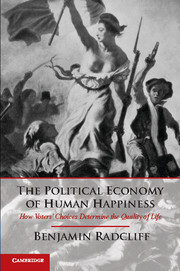Book contents
- Frontmatter
- Contents
- Acknowledgments
- Introduction
- 1 The Democratic Pursuit of Happiness
- 2 Market Democracy
- 3 Citizens or Market Participants?
- 4 The Scientific Study of Happiness
- 5 The Size of the State
- 6 Labor Unions and Economic Regulation
- 7 The American States
- 8 Between Market and Morality
- References
- Index
3 - Citizens or Market Participants?
Published online by Cambridge University Press: 05 March 2013
- Frontmatter
- Contents
- Acknowledgments
- Introduction
- 1 The Democratic Pursuit of Happiness
- 2 Market Democracy
- 3 Citizens or Market Participants?
- 4 The Scientific Study of Happiness
- 5 The Size of the State
- 6 Labor Unions and Economic Regulation
- 7 The American States
- 8 Between Market and Morality
- References
- Index
Summary
Before proceeding to examine empirically the consequences for human happiness of Left versus Right economic and social policies, it is necessary to first clarify what, precisely, the argument between these ideological poles is about. This requires in turn an appraisal of the arguments that the Right and Left make about the wisdom of attempting to manage or displace the market through political means. As will become apparent, the underlying axis of conflict ultimately concerns where sovereignty should be presumed to reside: in a self-regulating market of free individuals making free choices or in a democratic process of authoritative allocation through free political competition.
IN DEFENSE OF THE MARKET
The Grand Argument for the Market Economy
The market economy is a fact. The dominance of market ideas in the economic realm inevitably encourages citizens to interpret the wider world in ways that are consistent with market principles. There is thus a tendency for the market outcomes that surround us to appear as part of the natural order, and as such, deserving of respect and, perhaps, even reverence. Socially, we become accustomed to conceiving of the free market as the normal state of affairs, such that the burden of proof appears to be on those who advocate changing or “intervening” in the natural order it seemingly provides. Arguments in favor of markets, then, generally adopt a strategy of discrediting the arguments made against it, resting in effect upon the presumption of innocence that the market has come to enjoy. I examine a variety of such claims presently. In the interim, it may be instructive to actually consider the intellectual case for the market.
- Type
- Chapter
- Information
- The Political Economy of Human HappinessHow Voters' Choices Determine the Quality of Life, pp. 55 - 76Publisher: Cambridge University PressPrint publication year: 2013



